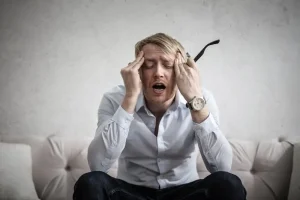
What is psychosis?
Psychosis can be characterized by symptoms such as delusions and hallucinations. It is often thought of as a severe mental disorder; however, it is not a disorder itself, but a rather a symptom of any number of disorders. Psychosis can occur in several psychiatric disorders such as schizophrenia, schizoaffective disorder, bipolar disorder, and severe depression. Psychosis can also be caused by substances, such as alcohol, marijuana, or other recreational drugs. Regardless of the cause of psychotic symptoms, they can be distressing for those who experience them, and seeking professional medical help is crucial.
Symptoms of Psychosis
Psychosis can be characterized by symptoms such as delusions and hallucinations. They are usually caused by imbalances of the neurotransmitter, dopamine, in the brain along certain tracts. Too much dopamine in some areas may cause symptoms, like delusions or hallucinations, while a deficiency in other areas of the brain may cause more behavioral or emotional disturbances.
Delusions are false beliefs that a person firmly holds despite evidence to the contrary. For instance, feeling as though someone is out to get you or falsely believing that you have superpowers. Hallucinations, on the other hand, are when one experiences a stimulus that is not experienceable by other people. Hallucinations may be auditory (hearing things), visual (seeing things), tactile (feeling things), or gustatory (tasting/smelling) things that other people cannot. The most common hallucinations are auditory hallucinations and usually manifest as hearing voices, sometimes familiar to the person hearing them.
Other symptoms one might experience or see in an individual with psychosis are: bizarre speech patterns and content, strange behavior or body movements, or not moving at all, flat or absent emotions, or not taking care of oneself.
Who is affected by psychosis?
Anybody from any age range can be affected by symptoms of psychosis. Because psychotic symptoms can be found in a number of disorders, each with their different onset and chronicity, it can be difficult to isolate any specific group as being more likely to develop symptoms over another.
Treatment for Psychosis
Symptoms of psychosis and the disorders associated with them may vary from person to person. Typically, a medication in the class of antipsychotics is prescribed. This class of medication has a bad reputation for negative side effects, but is usually extremely beneficial for most people. Therapy may also be useful in reducing or learning to live with symptoms. The most commonly used therapies to help with symptoms of psychosis are Cognitive Behavioral Therapy (CBT) and Cognitive Enhancement Therapy (CET). With medication and a trained therapist, most people go on to live fully productive lives and rarely face disruptions due to their disorder.
If you or someone you know is experiencing any of the symptoms above, contact Excel Psychiatry today. One of our providers specializing in symptom management can help you achieve an improved quality of life. Call us at 469-965-9799 or click on the yellow “Book Now” button at the top of the page.




